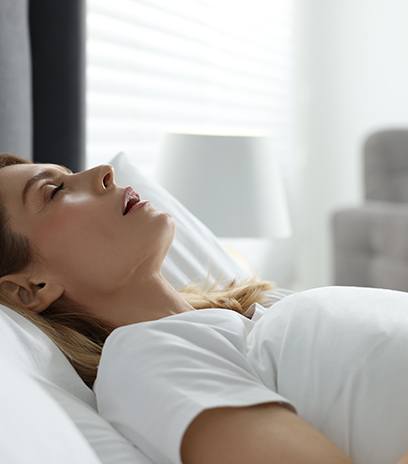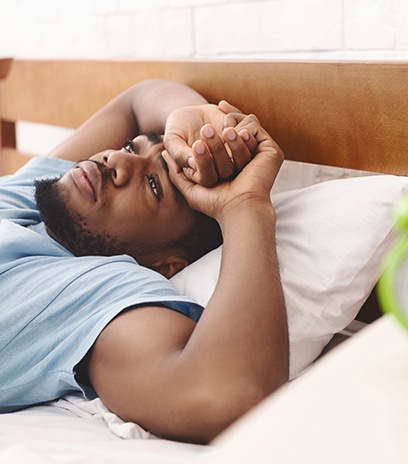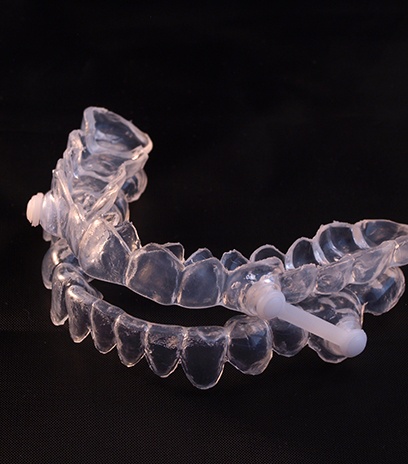

Far too many people across the United States suffer from poor-quality slumber as a consequence of sleep apnea. With the Berlin Questionnaire and the Epworth Sleepiness Scale, you can evaluate your own risk for sleep-disordered breathing and determine whether you need to speak to your doctor. Furthermore, Dr. Salibian can help treat your disorder with oral appliance therapy. Feel free to call us today to learn how we can help with sleep apnea.

You have sleep apnea if your breathing is repeatedly being interrupted when you slumber. This often happens due to muscles in the throat relaxing and blocking the flow of air. These pauses in breathing can cause you to wake up multiple times during the night, even if you don’t realize it.
Sleep apnea is closely associated with loud snoring, waking up gasping for air, constant tiredness, morning headaches, memory problems, and moodiness.

In the short term, sleep apnea can have a negative impact on your quality of life. You may feel drowsy during the day, and you might even be more likely to experience symptoms of depression. On top of that, there’s an increased chance that you could doze off while you’re driving, potentially leading to an accident.
Furthermore, if sleep apnea is not treated in time, your health may suffer. You’ll be at a higher risk for raised blood pressure, heart attacks, strokes, and more.

The Berlin Questionnaire is a 10-question test that is used as an aid for diagnosing sleep apnea. It was first created in 1996, and even to this day, it is still noted for its effectiveness. The questionnaire consists of the following questions:

Sleep disorders can cause you to feel unusually drowsy during the day. To determine whether this sleepiness warrants a visit to your doctor, you can use the Epworth Sleepiness Scale. It asks how likely you are to fall asleep during the following activities:
These activities are all ranked on a scale of 0 to 3, with 0 being no chance to fall asleep at all, 1 being a low chance, 2 being a moderate chance, and 3 being a high chance. This helps provide a picture of how your daytime drowsiness is affecting your everyday life.

The numbers you gave for each question are added up to create your final score. A score of 1 to 6 means you’re probably getting good-quality sleep. 7 to 9 means there’s room for improvement, and 10 or higher means that you likely have sleep apnea or another kind of sleep disorder.
What do your results look like after completing the Berlin Questionnaire and the Epworth Sleepiness Scale? Do they seem to indicate that you might have a sleep disorder? If so, you should have a sleep test performed as soon as possible. The longer you ignore sleep apnea, the more dire its effects on your health will be.

You do have the option of undergoing CPAP therapy to treat your sleep disorder. However, some patients stop using their CPAP machines due to noise and discomfort. Fortunately, our practice can offer an alternative in the form of oral appliance therapy.
We can give you a personalized night guard to wear while you sleep. The appliance will slightly reposition the jaw in order to help you maintain a clear airway. For many patients, this can be an effective way to reduce snoring and other symptoms of sleep apnea.

Sleep apnea must be dealt with promptly and properly if you want to avoid the long-term consequences of poor-quality slumber. We encourage you to learn as much as you can about sleep apnea so that you can figure out the best way to treat it. You can get started right now by reading the FAQs below. If there’s anything else you want to know about sleep apnea, feel free to contact our practice and ask our team any questions that are on your mind.
A pause in your breathing qualifies as a sleep apnea episode if it lasts for at least 10 seconds. Some pauses last considerably longer – up to 2 minutes in certain cases. A patient can have 5 to 30 sleep apnea episodes during a single hour of slumber. The more episodes you experience, the more severe your sleep disorder is considered to be. Tests can be performed to see how often you’re experiencing sleep apnea episodes in order to determine how advanced your case is and narrow down potential treatment methods.
Obesity and sleep apnea are often closely related. An excess amount of weight often means a greater chance of the airway becoming blocked by relaxed tissues in the throat. In many cases, losing weight can indeed go a long way toward reducing sleep apnea symptoms. However, this is not guaranteed to put a stop to the disorder entirely; it may still be necessary to use an oral appliance to keep your airway open during the night. In short, losing weight is one of several steps you can potentially take to address your sleep apnea.
Virtually anyone can potentially suffer from obstructive sleep apnea, but there are certain factors that can increase your risk of developing the disorder, such as:
Some people with sleep apnea also grind their teeth while they’re asleep. On the surface, you may worry that this could potentially be an obstacle to your ability to get an oral appliance. However, this is far from the case. Teeth grinding won’t affect your candidacy for oral appliance therapy. In fact, a well-made oral appliance can stop your upper and lower arches of teeth from making direct contact with each other, thus reducing the damage related to teeth grinding.
It’s estimated that only around half of patients who are prescribed CPAP therapy stick to the treatment; many individuals find the machine too noisy or the mask too uncomfortable. If you’re one of these patients, you may be considering oral appliance therapy as an alternative. After all, oral appliances make no noise and can be customized for the sake of your comfort.
In many cases, oral appliances can indeed replace a CPAP machine. However, this is generally only a viable option for patients with mild to moderate cases of sleep apnea; CPAP therapy may remain the best option for those with more severe sleep disorders. You’ll need to undergo a sleep test in order to determine what sort of treatment is appropriate in your case.
Sleep apnea is more common in men, but it can also occur in women, particularly those who are pregnant, past menopausal, or overweight. It’s important to remember that sleep apnea presents differently in women so that you have an accurate idea of what kinds of symptoms you need to look out for.
In men, sleep apnea often causes snoring and daytime sleepiness. Women, on the other hand, may experience different symptoms such as insomnia, depression, anxiety, and more. If any of these warning signs sound familiar, you should consider having a sleep test performed as soon as possible.
When you start wearing an oral appliance to treat sleep apnea, there will generally be an improvement in the quality of your slumber almost right away. That being said, you may need a couple of nights to get used to wearing your appliance. As time passes, take note of your sleep apnea symptoms; if they seem to be less severe than they used to be, or if they go away entirely, you can take that as a sign that your appliance is working as intended.
Since you’ll be putting your oral appliance in your mouth every night, you need to be able to keep it as clean as possible. The last thing you want is for harmful bacteria to build up on the appliance, which can raise your risk for cavities, gum disease, and even infections.
When you wake up in the morning, take the appliance out of your mouth and give it a thorough brushing. (It’s best to use a soft-bristled toothbrush that won’t damage the material on accident.) Once you’re done, rinse off the appliance and put it back in its protective case.
If you want to make sure that your appliance is as clean as possible, you should also make a point of periodically soaking it in denture cleanser.
I Need a Checkup & Cleaning I Need a Dentist for My Child I am Worried about Bleeding Gums I Have a Cavity or Broken Tooth I am Missing One or More Teeth I am Unhappy with My Smile I Want a Straighter Smile I am Scared of the Dentist I am in Pain & Need Help View Our Dental Services View Our Optometry Services